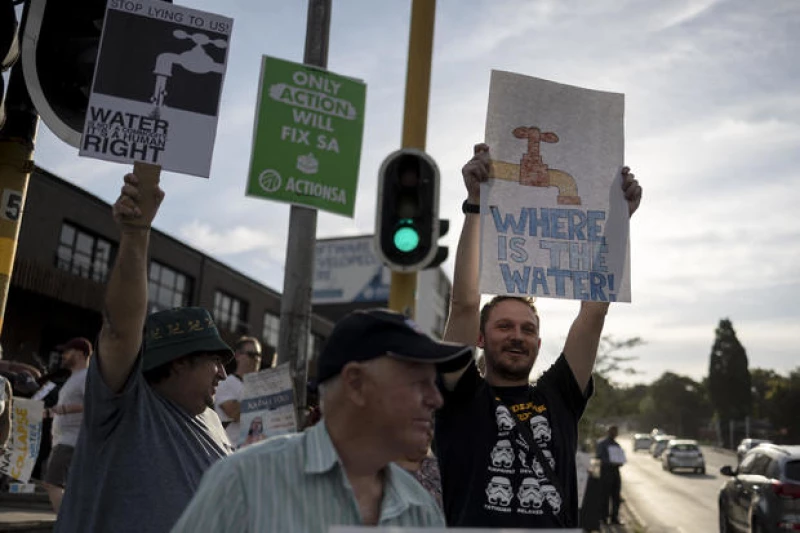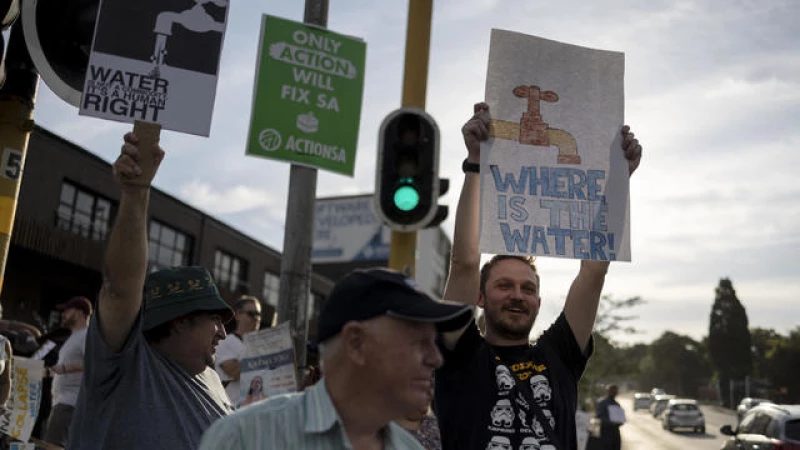Johannesburg — Tsholofelo Moloi has been standing in line for water for the past two weeks, along with thousands of other South Africans, as Johannesburg, the country's largest city, grapples with a massive breakdown of its water system impacting millions of people.
Residents from all walks of life are facing a water shortage of unprecedented proportions. The combination of scorching weather leading to dwindling reservoirs and decades of neglect causing infrastructure to crumble are the main culprits. The growing frustration among the public serves as a warning sign for the ruling African National Congress, which is facing a tough challenge in the upcoming election this year.
South Africa, already known for its long periods of electricity outages, is now introducing a new term - "watershedding", referring to the practice of living without water, inspired by "loadshedding" which is living without electricity.
- One of the world's most populated cities is nearly out of water
Moloi, a resident of Soweto on the outskirts of Johannesburg, is uncertain about how much more she and her community can endure.

They and others across South Africa's economic hub of about 6 million people line up day after day for the arrival of municipal tanker trucks delivering water. Before the trucks finally arrived the day before, a desperate Moloi had to request water from a nearby restaurant.
There was no other alternative. A 1.3-gallon bottle of water sells for 25 rand ($1.30), an expensive exercise for most people in a country where over 32% of the population is unemployed.
"We are really struggling," Moloi said. "We need to cook, and children must also attend school. We need water to wash their clothes. It's very stressful."
Residents of Johannesburg and surrounding areas are long used to seeing water shortages — just not across the whole region at once.
Over the weekend, water management authorities with Gauteng province, which includes Johannesburg and the capital, Pretoria, told officials from both cities that the failure to reduce water consumption could result in a total collapse of the water system. That means reservoirs would drop below 10% capacity and would need to be shut down for replenishment.
That could mean weeks without water from taps — at a time when the hot weather is keeping demand for water high. The arrival of chilly winter in the Southern Hemisphere is still weeks away.
No drought has been officially declared, but officials are pleading with residents to conserve what water they can find. World Water Day on Friday is another reminder of the wider need to conserve.
Water Crisis Grips South Africa
Outraged activists and residents say this crisis has been years in the making. They blame officials' poor management and the failure to maintain aging water infrastructure. Much of it dates to the years just after the end of apartheid, when basic services were expanded to the country's Black population in an era of optimism.
The ANC long rode on that enthusiasm, but now many South Africans are asking what happened. In Johannesburg, run by a coalition of political parties, anger is against authorities in general as people wonder how maintenance of some of the country's most important economic engines went astray.
In recent days, even residents of Johannesburg's more affluent and swimming pool-dotted suburbs have found themselves relying on the arrival of municipal water tankers, which came as a shock to some.
Residents in one neighborhood, Blairgowrie, came out to protest after lacking water for nearly two weeks.
A local councilor in Soweto, Lefa Molise, told The Associated Press he was not optimistic that the water shortage would be resolved soon.
Water cuts have become so frequent that he urges residents to reserve any supply they can find, especially when he said authorities give little or no warning about upcoming shortages.
The water tankers are not enough to keep residents supplied, he added.
Thabisile Mchunu, an elderly resident, expressed her struggle with the ongoing water crisis, mentioning that her taps have been dry for a week now. She has resorted to carrying water in 20-liter buckets from wherever she can find it.
"The sad thing is that we don't know when our taps are going to be wet again," she lamented.
Rand Water, the government organization responsible for supplying water to multiple municipalities in Gauteng province, issued a plea this week for residents to cut down on their water usage. The interconnected reservoirs that feed into their system are currently operating at only 30% capacity, and any excessive demand on one reservoir impacts them all.
Interestingly, South Africa's well-known electricity challenges have also contributed to the water crisis. Johannesburg Mayor Kabelo Gwamanda revealed on Tuesday that a lightning strike had caused a power station supplying electricity to a major water pumping station in the city to fail.







